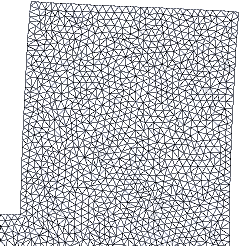Frameworks:
FEM - Finite Element Framework
The FEM framework makes it easy to write adaptive parallel programs based on the Finite Element Method. Programs can be written in Fortran90, C, or C++.
FEM is no longer under development, but it has been replaced by the ParFUM framework, which supports additional features such as incremental mesh modification and full adjacency tables.
 Simple Structural Mesh
Simple Structural Mesh
Using the FEM framework also allows you to take advantage of all the features of CHARM++, including run-time load balancing, performance monitoring and visualization, and checkpoint/restart, with no additional effort.
A parallel FEM application written using the FEM framework closely resembles a sequential program. The difference is that in the FEM framework, the user's main subroutine operates on one of the many "chunks" of the unstructured mesh. These chunks are created from the serial mesh using, for example, the Metis graph partitioning library.
The only other calls needed by an FEM framework program are to:
The framework allows you to easily visualize the results of an ongoing simulation. See the NetFEM page for details.
The framework currently targets explicit codes; although some implicit solvers, such as the conjugate gradient method, can also be applied. We are working to add better support for parallel implicit solvers.
FEM is no longer under development, but it has been replaced by the ParFUM framework, which supports additional features such as incremental mesh modification and full adjacency tables.
 Simple Structural Mesh
Simple Structural Mesh
Using the FEM framework also allows you to take advantage of all the features of CHARM++, including run-time load balancing, performance monitoring and visualization, and checkpoint/restart, with no additional effort.
A parallel FEM application written using the FEM framework closely resembles a sequential program. The difference is that in the FEM framework, the user's main subroutine operates on one of the many "chunks" of the unstructured mesh. These chunks are created from the serial mesh using, for example, the Metis graph partitioning library.
The only other calls needed by an FEM framework program are to:
- Register data fields that need to be communicated between chunks (for example, nodal attributes)
- Trigger an "update" of these shared data fields across processors (for example, to share nodal forces before a position update)
- Reduce a value across the machine (for example, to check convergence criteria or global energy)
The framework allows you to easily visualize the results of an ongoing simulation. See the NetFEM page for details.
The framework currently targets explicit codes; although some implicit solvers, such as the conjugate gradient method, can also be applied. We are working to add better support for parallel implicit solvers.
People
Papers/Talks
13-16
2013
[Paper]
[Paper]
Parallel Science and Engineering Applications: The Charm++ Approach [Book 2013]
08-15
2009
[Paper]
[Paper]
Parallel Simulations of Dynamic Fracture Using Extrinsic Cohesive Elements [J. Sci. Comp. 2009]
08-13
2008
[Paper]
[Paper]
A Case Study in Tightly Coupled Multi-paradigm Parallel Programming [LCPC 2008]
05-05
2005
[MS Thesis]
[MS Thesis]
Implementation of Parallel Mesh Partition and Ghost Generation for the Finite Element Mesh Framework [Thesis 2005]
00-01
2000
[Paper]
[Paper]
A Parallel Framework for Explicit FEM [HiPC 2000]
98-09
1998
[Paper]
[Paper]
Programming Languages for CSE: The State of the Art [IEEE Computational Science and Engineering 1998]









